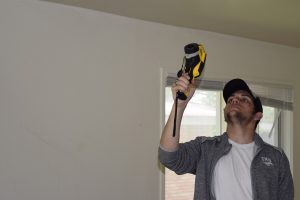(WACO, Texas) – Some Texas State Technical College students are learning how consumers can save money for their residences by making them more energy-efficient.
Students in the Residential Building Performance Consulting class used a vacant home on campus on Monday to perform a series of tests to find out where outside air leaked in, and vice versa.
“I want students to learn the actual mechanics of how to set up and perform the tests and how to correct the seals we have,” said Hugh Whitted, an instructor in TSTC’s Energy Efficiency Specialist and Solar Energy Technology programs.
Before testing started, students found every interior opening they could to seal with plastic. Whitted led students through the first test by using a blower to measure how airtight the house was.
“It depressurizes the house so air comes through the cracks and you can seal them,” he said.
Students used a variety of tools, including smoke pencils and thermal cameras, to conduct the tests.
“It’s a good eye-opener to the kind of equipment we will use in the field,” said Christian Bolyard, a TSTC student from Bridge City.
Whitted said students found problems with air leaking through electrical outlets.
Johnathan Rhodes, a TSTC student from Plano, said air leaks can be challenging in older homes.
“Older houses can be terribly constructed because this (the energy code industry) is relatively new,” he said. “It’s important to pay attention to detail and construction.”
Students also performed a duct-blaster test and did a carbon monoxide reading on the home.
“I’m learning some of these buildings are air-challenged and that we may come across things that are not in new buildings that we have to work with,” Bolyard said.
Homes that are insulated well can receive good scores on the Home Energy Score Report from the U.S. Department of Energy. On a scale of 1-10, scores on the higher end mean there is lower energy usage and cost.
TSTC’s Energy Efficiency Specialist certificate is a two-semester program in Waco preparing students for jobs in energy auditing and green marketing. Whitted teaches students to use the International Code Council’s International Energy Conservation Code, which is designed to meet the need for efficient mechanical, lighting and power systems through model code regulations that result in optimal utilization of fossil fuel and nondepletable resources.
TSTC’s Energy Efficiency Specialist certificate is part of a “triple crown” combination, which includes the Associate of Applied Science degree in Solar Energy Technology and the Certificate I in Electrical Construction.
Bolyard and Rhodes are both taking the combined certificate and degree programs.
“It’s been fantastic,” Rhodes said. “I love the hands-on learning, and the instructors tell us stories about what they have experienced in the field.”
Registration for the fall semester is underway.
For more information on Texas State Technical College, go to tstc.edu.
